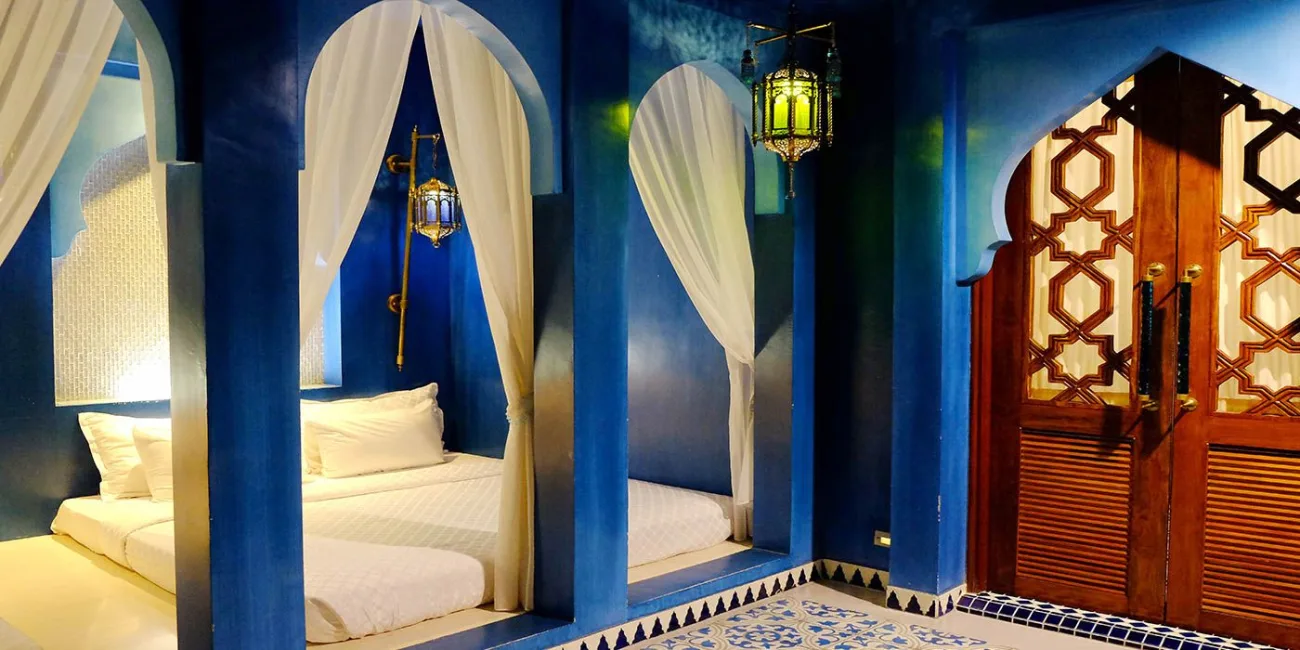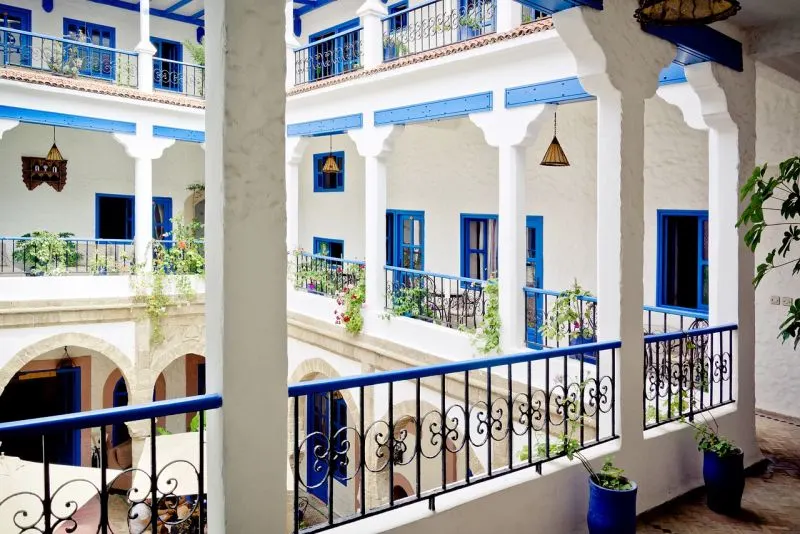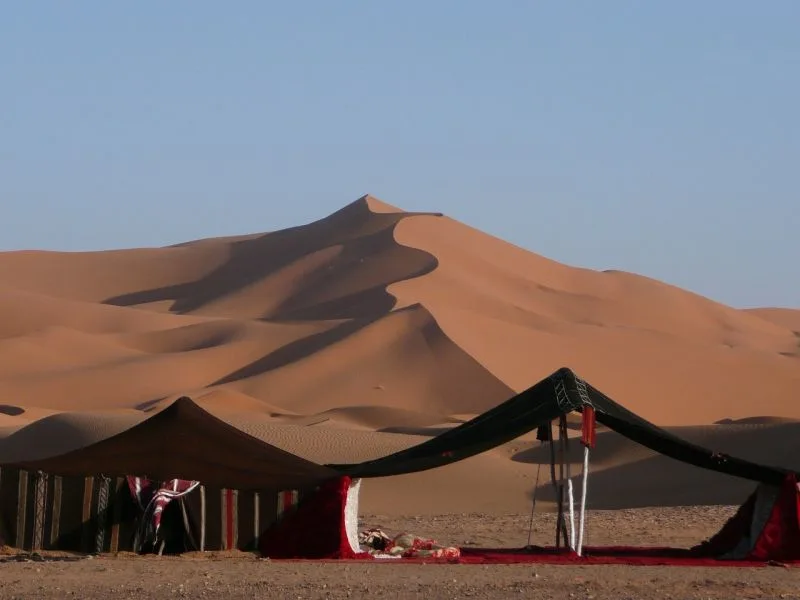A Full Guide about Accommodation in Morocco
There are different types of accommodations in Morocco, making it a very special destination. Know more about the types of Morocco accommodation

Ensured by the Travel Puffs that the rich experience with Morocco Travel Packages proves that there is an overwhelming variety of accommodation to choose from. Whether five-star camping, self-catered accommodation, or a riad, there is one thing you can be sure of: the quality of the welcome. There is something for every taste and every budget.
Morocco's diverse landscape features remarkable places to stay, offering a glimpse into its rich history through its unique architecture and cultural significance. Imagine wandering through traditional riads, which are named after the Arabic word "ryad" and are known for their serene garden courtyards. Once the homes of merchant princes, these riads now serve as intimate boutique hotels, and their walls tell stories of Morocco's golden age.
The variety of accommodations in the country reflects its varied terrains and traditions. Ancient kasbahs, with their mud-brick towers, stand proudly atop the Atlas Mountain ridges, transformed into unique lodgings. Berber desert camps invite adventurous travelers to sleep under the starry skies of the Sahara, while traditional gîtes provide a glimpse into authentic Moroccan life. Nature enthusiasts can find 90 thoughtfully placed camping grounds across pristine landscapes, while history buffs may prefer staying in restored fortress hotels that offer spectacular views from their ancient ramparts. Every choice promises more than just a place to sleep; it is a gateway into Morocco's rich cultural heritage, making each night's stay a chapter in your Moroccan adventure.
Do not miss completing your Experience with our Blogs:
- Cities Facts for the Best Morocco Vacation
- Famous Moroccan Food
- Morocco Shopping: Best Souvenirs to buy
The best area depends on your interests: Marrakech's Medina for culture and convenience, Gueliz for modern amenities, Essaouira for coastal charm, Fez Medina for authentic history, Agadir for beach resorts, Chefchaouen for mountain tranquility, or Merzouga for Sahara desert access. First-timers usually prefer Marrakech's medina or Gueliz.
Traditional Moroccan accommodation is called a riad (house with an interior courtyard) or a dar (smaller traditional house). You'll also find kasbahs (fortified houses), standard hotels, maisons d'hôtes (guesthouses), riads converted to boutique hotels, and luxury resorts in cities and coastal areas.
Understanding Morocco's Unique Accommodation Types
Morocco's architectural heritage speaks through its dwelling places, each structure revealing layers of cultural wisdom passed down through generations. These time-honored spaces serve as portals into Moroccan life, offering guests far more than simple lodging.
Riads: Traditional Courtyard Houses
"Ryad," the Arabic word meaning garden, perfectly captures the essence of these remarkable dwellings. Noble families and prosperous merchants once called these havens home, their design reflecting Islamic privacy principles through virtually windowless street facades.
Step through massive wooden portals and discover secret gardens of serenity. Fountains sparkle at the heart of these sanctuaries, their waters mingling with fruit tree shadows to create nature's cooling system during scorching Moroccan afternoons. Rooms radiate from this verdant core, their galleries and balconies peering into the courtyard below.
These architectural marvels typically rise two to four levels skyward. Social spaces occupy ground floors, while private chambers claim upper stories, crowned by roof terraces that command sweeping medina views. Master craftsmen have adorned every surface - geometric zellige tiles dance across walls, intricate plasterwork traces delicate patterns, and painted cedar ceilings tell stories overhead.
Kasbahs: Ancient Fortresses Turned Hotels
Standing proud like Morocco's medieval sentinels, kasbahs crown hilltops with fortified silhouettes. These commanding structures, fashioned from earth and straw, sheltered local chieftains while watching the surrounding lands.
The most magnificent examples grace the High Atlas region and dot southern Morocco's legendary "route of 1000 Kasbahs". Modern restoration has breathed new life into these ancient strongholds, preserving their historic shells while welcoming modern travelers.
Kasbah captures guests through its theatrical settings and rich histories. Traditional building materials merge seamlessly with contemporary comforts, while rooftop spaces reveal breathtaking panoramas. From the palatial Kasbah Tamadot to charming family-operated properties, these transformed fortresses span the spectrum from grandeur to genuine warmth.
Dars: Smaller Traditional Homes
"Dar," Arabic for the house, represents a more intimate interpretation of Moroccan domestic architecture. Unlike their grander riad cousins, these modest dwellings rise one or two stories.
Their central courtyards tell more straightforward stories - a solitary fountain might sing alone, unaccompanied by the lush gardens found in riads. Though more restrained in size and ornamentation, dars still bear the hallmarks of Morocco's masterful craftsmanship.
The slightest variation, known as a "dirwa," distills this architectural tradition to its essence - just two salons, one above the other, embracing a diminutive courtyard.
Luxury Accommodation in Morocco: Where Opulence Meets Tradition
Morocco's finest lodgings paint pictures of sublime grandeur, where age-old craftsmanship dances with modern luxury. These remarkable properties honor their cultural roots while pampering guests with world-class comforts.
Palatial Riads and Heritage Properties
Standing proudly as Morocco's crowning hospitality achievement, the Royal Mansour Marrakech emerged from King Mohammed VI's vision of perfection. Within its walls, 53 private riads showcase individual pools, each space telling tales of artistic mastery crafted by 1,200 master artisans. The property's recent acclaim as "the most welcoming hotel in the world" at World's 50 Best Hotels 2024 speaks volumes of its matchless hospitality.
Hidden behind Marrakech's medina walls, La Sultana beckons romance seekers to its enchanting chambers, mere footsteps from royal palaces and cultural treasures. Those yearning for more intimate surroundings find solace at Riad Farnatchi, where ten masterfully adorned suites blend centuries-old architecture with contemporary indulgences.
Five-Star Resorts with Moroccan Flair
Global luxury titans have embraced Morocco's architectural soul with stunning results. Amanjena rises like a rose-tinted mirage from old Marrakech's design palette. Fountains whisper through shaded courtyards, leading guests to lavish pavilions and maisons, many boasting private pools. Beyond its walls, olive groves stretch toward the Atlas peaks.
The Oberoi Marrakech pays homage to the 16th-century Medresa Ben Youssef, its twenty-eight acres embraced by ancient olive and citrus groves. Meanwhile, Mandarin Oriental Marrakech commands attention through its vast gardens, where luxury blooms amid meticulously landscaped grounds.
Exclusive Desert Camps for the Discerning Traveler
Luxury ventures deep into Saharan sands, where Desert Luxury Camp creates oases of comfort at Erg Chebbi and Erg Chigaga. Modern amenities - from en-suite bathrooms to air conditioning - complement desert adventures like camel treks and sandboarding.
Merzouga Luxury Desert Camp surprises with ten canvas palaces, each with unexpected refinements—proper bathrooms, hot showers, and modern conveniences. Flames dance beneath star-scattered skies as night falls while Berber musicians weave ancient melodies. Morning brings feasts of fresh juices and traditional crepes, proving that fine dining knows no boundaries.
These desert sanctuaries command €245 to €300 per person nightly, while legendary properties like Royal Mansour represent the zenith of Moroccan hospitality artistry.
Discover unique stays across Morocco with our tailored Morocco travel packages. Book your journey today!

Yes, $50 (500 MAD) is significant in Morocco. You can get a nice hotel room ($40-60), enjoy 5-6 restaurant meals, take multiple grand taxis, or buy quality souvenirs. Daily budget travelers spend $40-70 total, while mid-range travelers spend $100-150 per day.
Yes, you can hold your girlfriend's hand in Morocco, especially in tourist areas like Marrakech, Essaouira, Agadir, and Casablanca. Hand-holding is generally acceptable and common among couples. However, avoid kissing or excessive public displays of affection as these are culturally inappropriate everywhere.
Authentic Morocco Trips
Camping in Morocco
A Moroccan kiss refers to the traditional greeting of kissing both cheeks (sometimes alternating twice) between friends and family of the same gender. You'll see women kiss women and men kiss men as a respectful greeting. It's not romantic - just a cultural custom similar to European cheek kisses.
Customize Your Dream Vacation!
Get in touch with our local experts for an unforgettable journey.
Plan Your TripAuthentic Cultural Stays: Living Like a Local
Morocco reveals its most authentic self through homestays and cultural lodgings, where everyday life unfolds beyond tourist paths. These genuine accommodations forge lasting bonds between visitors and local families, offering rare glimpses into traditions passed down through generations.
Homestays with Moroccan Families
Life within Moroccan family homes paints vivid pictures of authentic daily rhythms. Mealtimes become cultural ceremonies, with host families sharing breakfast and dinner, weaving tales of local life between servings of traditional dishes. Western guests soon discover different privacy customs - family members might transform their salon into sleeping quarters, reserving proper bedrooms for visitors.
Urban dwellings typically offer modern touches like WiFi, though amenities vary by location. Shared bathrooms remain standard practice, reflecting traditional household arrangements. Winter visitors should note the absence of central heating in these classic brick-and-mortar structures - extra layers prove essential between November and March.
Traditional Berber Accommodations
High Atlas peaks guard centuries-old Berber dwelling traditions. Berber Family Lodge exemplifies this heritage, its earthen walls emerging from mountainsides to frame Mount Toubkal's majestic silhouette. Kitchen gardens supply fresh ingredients for family meals, offering flavors far removed from tourist establishments.
The "Berber Salon" presents another window into mountain life. These clever spaces shape-shift with the sun's journey—welcoming gathering spots by day transform into cozy sleeping quarters as night falls—many feature elevated sleeping galleries and stargazing terraces, where guests drift off beneath crystalline mountain skies.
Farmstays and Rural Retreats
Morocco's agricultural heartland beckons through farm stays celebrating time-honored cultivation methods. Ferme D'hôte Zomorroda welcomes guests with private sanctuary spaces, refreshing pools, and verdant vistas. Bio et Bois Luxury Bio Farm champions earth-friendly farming principles.
These countryside havens serve as launching points for nature exploration. Sidi Kaouki Ranch delights families with its menagerie of horses, donkeys, and chickens, creating lasting memories for young adventurers.
Morocco's lodging tapestry weaves together countless threads of cultural heritage. Each chosen stay shapes travelers' memories - from nights spent beneath carved cedar ceilings in Marrakech's opulent riads to evenings warmed by Berber hospitality high in the Atlas peaks. These spaces transcend mere shelter, becoming chapters in personal Moroccan tales.
Thoughtful wanderers discover Morocco's magic at every price point. Modest guesthouses and hostels preserve authentic charm, while palatial properties showcase generations of master craftsmanship. Ancient kasbahs and family homes open their doors to share centuries of tradition, turning simple stays into cultural journeys.
Future visitors should ponder their perfect Moroccan moment. Some souls find peace in tiny dars tucked within Fez's labyrinthine medina, while others yearn for mountain kasbah views stretching toward infinite horizons. Whatever path beckons, Morocco's remarkable array of accommodations promises to elevate every journey through this enchanting land.
FAQs
Q1. What are the unique types of accommodation in Morocco?
Morocco offers diverse accommodation options, including riads (traditional houses with central courtyards), kasbahs (ancient fortresses converted into hotels), and dars (smaller traditional homes). Each type provides a distinct cultural experience and insight into Moroccan architecture and lifestyle.
Q2. Are there budget-friendly accommodation options in Morocco?
Yes, Morocco caters to budget travelers with various affordable options. These include hostels in major cities, budget-friendly riads and guesthouses, and numerous camping sites throughout the country. Some hostels offer dorm beds for as low as $8 per night, while camping in the Sahara can start from $9 per night.
Q3. What luxury accommodation experiences are available in Morocco?
Morocco boasts world-class luxury accommodations, including palatial riads like the Royal Mansour Marrakech, five-star resorts such as Amanjena and The Oberoi Marrakech, and exclusive desert camps offering high-end amenities in the Sahara. These properties combine opulence with traditional Moroccan design and hospitality.
Q4. How can I experience authentic Moroccan culture through accommodation?
For an immersive cultural experience, consider homestays with Moroccan families, traditional Berber accommodations in the Atlas Mountains, or farmstays in rural areas. These options allow you to live like a local, enjoy home-cooked meals, and gain deeper insights into Moroccan traditions and daily life.
Q5. What's the difference between a riad and a regular hotel in Morocco?
A riad is a traditional Moroccan house built around a central courtyard or garden, offering an intimate and authentic experience. Riads typically have fewer rooms and showcase intricate Moroccan craftsmanship. In contrast, regular hotels are often more significant, more modern establishments with standardized services and amenities.

Article 490 criminalizes sexual relations outside marriage in Morocco, applying to both Moroccans and foreigners. You could face prosecution, fines, or imprisonment. In reality, tourists staying in hotels are rarely targeted, and enforcement focuses mainly on Moroccan citizens. Unmarried couples should exercise discretion.






